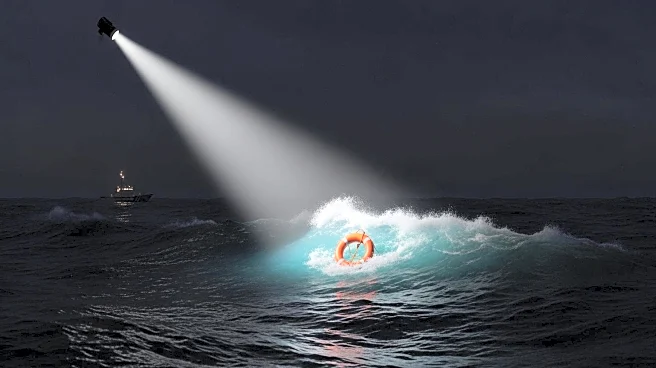What's Happening?
A tragic incident occurred off the coast of Ayvalik, Turkey, where a migrant vessel collided with a Turkish Coast Guard vessel at high speed, resulting in the deaths of five individuals and injuring one more. The collision took place near the island of Lesvos, a common route for migrants seeking asylum opportunities in the European Union. The boat carried 34 people, including the operator, all of whom ended up in the water following the collision. A search and rescue mission led to the recovery of five bodies, and one injured person was hospitalized. The Turkish Coast Guard frequently engages in rescue operations in this region, which is a mere eight nautical miles from Greek territory. This area has been a focal point for migration, with previous incidents involving allegations of pushbacks by the Hellenic Coast Guard, a claim that is often contested by Greece.
Why It's Important?
This incident highlights the ongoing challenges and dangers faced by migrants attempting to cross the Aegean Sea to reach Europe. The collision underscores the perilous nature of these journeys and the complex geopolitical tensions between Turkey and Greece regarding migration policies. The situation also draws attention to the broader humanitarian issues and the need for effective international cooperation to address the root causes of migration and ensure the safety of those seeking refuge. The fatalities in this incident may prompt further scrutiny of border patrol practices and the treatment of migrants in the region, potentially influencing future policy decisions and international relations.
What's Next?
In the wake of this incident, there may be increased calls for investigations into the circumstances surrounding the collision and the broader practices of border patrols in the region. Human rights organizations and international bodies might advocate for more stringent oversight and accountability measures to prevent similar tragedies. Additionally, diplomatic discussions between Turkey and Greece could intensify, focusing on improving coordination and cooperation in managing migration flows and ensuring the safety of individuals at sea. The incident may also influence EU migration policies, potentially leading to reforms aimed at enhancing the protection of migrants and addressing the humanitarian aspects of the crisis.
Beyond the Headlines
The collision raises ethical questions about the responsibilities of nations in safeguarding human lives during migration crises. It also highlights the ongoing debate over the legality and morality of pushback practices, which are often criticized by human rights groups. The incident could lead to a reevaluation of international maritime laws and the obligations of coastal nations in providing assistance to those in distress at sea. Furthermore, it may prompt a broader discussion on the need for comprehensive solutions to address the factors driving migration, such as conflict, poverty, and climate change.









